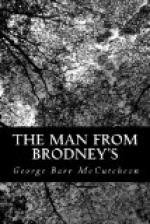“Bosworth also says that the islanders are thrifty, intelligent and will fight for their rights. There are lawyers among them, he says, as well as jewel diggers and fishermen.”
“Skaggs and Lady Deppingham’s grandfather were the only white men who ever lived there long enough to find out what the island had stored up for civilisation. That’s why they bought it outright, but I’m hanged if I can see why he wants to give it back to the natives.”
“Perhaps he owes it to them. He doubtless bought it for a song and, contrary to all human belief, he may have resurrected a conscience. Anyhow, there remains a chance for the heirs to break the will.”
“It can’t be done, Hare, it can’t be done. It’s as clean an instrument as ever survived a man.”
It is, by this time, safe for the reader to assume that Mr. Taswell Skaggs had been a rich man and therefore privileged to be eccentric. It is also time for the writer to turn the full light upon the tragic comedy which entertained but did not amuse a select audience of lawyers on both sides of the Atlantic. As this tale has to do with the adventures of Taswell Skaggs’s heirs and not with the strange old gentleman who sleeps his last sleep literally in the midst of the island of Japat, it is eminently wise to make as little as possible of him.
Mr. Skaggs came of a sound old country family in upper England, but seems to have married a bit above his station. His wife was serving as governess in the home of a certain earl when Taswell won her heart and dragged her from the exalted position of minding other people’s children into the less conspicuous one of caring for her own. How the uncouth country youth—not even a squire—overcame her natural prejudice against the lower classes is not for me to explain. Sufficient to announce, they were married and lived unhappily ever afterward.
Their only son was killed by a runaway horse when he was twenty, and their daughter became the wife of an American named Browne when she was scarcely out of her teens. It was then that Mr. Skaggs, practically childless, determined to make himself wifeless as well.
He magnanimously deeded the unentailed farm to his wife, turned his securities into cash and then set forth upon a voyage of exploration. It is common history that upon one dark, still night in December he said good-bye forever to the farm and its mistress; but it is doubtful if either of them heard him.
To be “jolly well even” with him, Mrs. Skaggs did a most priggish thing. She died six months later. But, before doing so, she made a will in which she left the entire estate to her daughter, effectually depriving the absent husband of any chance to reclaim his own.
Taswell Skaggs was in Shanghai when he heard the news. It was on a Friday. His informant was that erstwhile friend, Jack Wyckholme. Naturally, Skaggs felt deeply aggrieved with the fate which permitted him to capitulate when unconditional surrender was so close at hand. His language for one brief quarter of an hour did more to upset the progress of Christian endeavour in the Far East than all the idols in the Chinese Empire.




